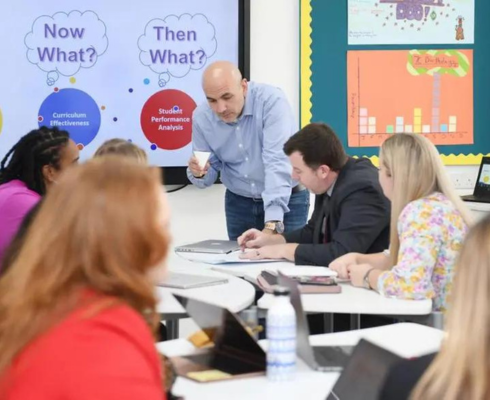
How School Is a Crucial Part of Every Child’s Developmental Journey
By Dr Saima Rana, CEO/Principal, GEMS World Academy – Dubai
Children live in dual worlds – one made up of family and home, the other of school. It is in the latter that they learn most of the skills they will need for adulthood, when they will increasingly have to find their own way, working in careers that can take them far from their origins to different societies, where having to learn new skills and knowledge is a norm, and where facing change and adapting to it are unavoidable. As a result, it is no longer the case that families alone can prepare their children for what is to come.
Schools give children the safe and secure environment needed to learn the social skills they are going to need in the future. Schools help them learn how to make friends, how to concentrate and experiment, how to obey and command, how to manoeuvre and plot, weigh up risks and care for others. School helps them learn the basics of their spiritual and moral existence, providing them with opportunities to understand their feelings of awe and wonder when confronted with elements of themselves, nature or the greater universe.
Schools encourage hobbies and games that lay the foundations of understanding the laws of the market, of supply and demand, bargaining, cooperation and competition. Schools shape and mould not only children’s minds – which they do through a formal, broad and balanced curriculum of distinct subjects – but also their personality and character, their spirit and emotions, as well as their bodies.
Without physically attending school, a child is confined to the world of their family, and in turn not exposed to the enormously important learning opportunities afforded by the world of school. This is why a large – and perhaps the most meaningful – part of schooling is devoted to developing all-absorbing hobbies and interests, collaborative games and sports, performance and expressive subjects such as music, drama and arts and crafts, as well as lifelong friendships that go way beyond the classroom.
School as a Bridge between Childhood and Adulthood
That’s not to say home and family are negative or lacking; rather that we need the parallel worlds of family and school in order to understand how we live today. Traditionally, the family was able to hold on to important things such as morality, behaviour and social training, while schooling was about developing those basic skills parents couldn’t or didn’t have the time to impart, like teaching basic literacy, numeracy and received traditions from the past. Today, however, children need to be able to enter a world that is not dominated by their families, where they live separate lives and follow career paths that potentially take them far from home. A great school works in place of the parents while the children attend it, acting as a transition from the world of the family to the world beyond.
In this way, school can be seen as a bridge and a crucial part of a child’s developmental journey, reflected in the sense of upward movement through the hierarchies built into schools and education itself. This journey sees the child follow carefully constructed and guided routes through the years, moving inexorably from the family towards full adulthood. As a child progresses through school, they learn how to start to question and challenge, how to understand and care about the new and the different, and they become sensitive to other points of view and people that are different to them.
Gently but firmly, they learn about themselves and how to argue, think, question, rearrange and present to make something new and fresh. In so doing, they learn how to become modern citizens looking to contribute positively to the world. At the same time, the hierarchical nature of school builds maturity, so by the time a student reaches their final year, they are rewarded with privileges they did not have in the earlier stages of their school lives. They also earn responsibility to care for the younger members of the school community, acting as positive role models and mentors. Understanding the relation between reward and responsibility is a key element of the experience schools provide, developing service to others that is so key to being a successful, generous and caring citizen.
Ensuring Children Feel Safe, Happy and Secure
Of course, given the ongoing pandemic, concerns around schools’ ability to keep children safe are only natural. At GEMS World Academy – Dubai, we have a strong infrastructure of systems and protocols to ensure student wellbeing, safety and safeguarding are all in place – and the effectiveness of these has been clearly demonstrated over the past academic year.
Electronic security systems, systematic registration and checks on staff and adults in relation to the school are strong and our first priority. The additional protocols and systems to deal with the pandemic include ruthlessly ensuring facemasks, social distancing and hand washing protocols are all followed. In addition, all staff were vaccinated as soon as was possible. As a result, we have been recognised by government inspection teams as a place of excellent practice regarding safety and safeguarding measures.
But safety is not just about these formal measures. It is about ensuring children feel safe and wanted, happy and secure. This is why we have made staying open such an important goal: it is clear that students who are kept out of their school community for long periods can become lonely and depressed. Despite the pandemic, we have therefore maintained as much of the normal school routines and practices as possible. After-school clubs and activities have also been maintained wherever possible – again, because we know that in a time of high anxiety and stress, such activities are very important in allaying children’s fears, giving them a necessary sense of security and normalcy.
We continue to ensure high levels of personal wellbeing are tracked and maintained, and that our culture of zero tolerance of bullying and snobbery remain the centre of a school culture that emphasises care, kindness, bravery, friendship, grit, curiosity, flair and competitive fair play. Our school is a learning hub of values that encompass mind, heart, spirit and body so that each young person in our care is treated with respect and delight. Nothing is more important to us than the safety and wellbeing of our students, and that is why every GEMS World Academy student is treated as being the centre of everything we do and care about.





